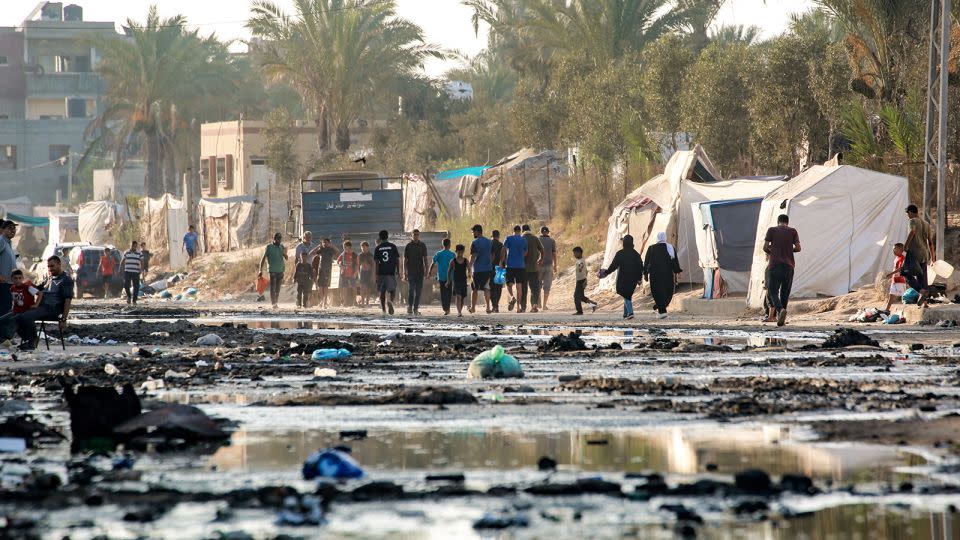Progress made in Gaza ceasefire talks but still work to do on ‘final details,’ US official says
Negotiators continue to work to strike a deal for a ceasefire in Gaza and the release of Israeli hostages, White House National Security Council spokesperson John Kirby said Monday, following a massive exchange of fire between Israel and the Iran-backed Lebanese militant group Hezbollah over the weekend.
Talks had made progress over the weekend, according to a senior US official familiar with the talks in Cairo, where mediators discussed “final details” of a potential agreement including the names of prisoners that would be exchanged as part of the pact.
While such progress does not guarantee a final agreement anytime soon, negotiators in the Egyptian capital are now discussing the “nuts and bolts” of a deal, the official said.
Kirby on Monday noted that all sides, including Hamas, are represented in the talks and that the discussions have been able to move on with more specificity as they work to hammer out a deal.
Bassem Naim, a Hamas political bureau member, said Hamas was not participating in negotiations on Monday. Speaking to Al Arabi TV, he reiterated Hamas’s position that it is “ready to negotiate what was agreed upon” in a July 2 proposal but will “not accept the conditions that [Israel Prime Minister Benjamin] Netanyahu added.”
Negotiators have worked for months to bridge demands by Netanyahu and Hamas, the militant group that governs Gaza.
The remaining sticking points, while significant, are seen as potentially surmountable, the official said.
One issue is the Israeli military’s presence on Gaza’s side of the border with Egypt, an area known as the Philadelphi corridor. Hamas opposes Israel’s desire to continue to station troops there in the early phase of a ceasefire deal.
The US official said the current proposal calls for an Israeli military withdrawal from “densely populated areas” in Gaza, and that the current debate is focused on what parts of the Philadelphi corridor qualify as densely-populated versus unpopulated, where the IDF will maintain a presence in the first phase of an agreement.
However, the Hamas negotiating delegation left Cairo on Sunday publicly reiterating the group’s demand that any agreement must include “a permanent ceasefire, a complete withdrawal from the Gaza Strip, the freedom of return of residents to their areas, relief and reconstruction, and a serious exchange deal.”
The US official said despite public comments by Hamas, “negotiators believe Hamas may be more flexible on an Israeli presence during the first phase of an agreement.”

The proposed agreement involves a “huge surge of humanitarian aid”, as well as a commitment to remove rubble and begin reconstruction, which are intended to bring “massive relief for Gazans,” said the US official.
US negotiators expect Hamas leader Yahya Sinwar to receive a copy of the latest proposal as soon as the coming days, though the timing is not clear given the difficulty of communications with him.
A second US official said talks in Cairo were “constructive and were conducted in a spirit on all sides to reach a final and implementable agreement,” and that lower-level working group talks would continue in the coming days to “further address remaining issues and details.”
On Thursday, the US and Egypt met with Israel to try to narrow remaining gaps and clarify issues in the text of bridging proposal, according to a source familiar with the matter. The US and Egypt met bilaterally on Friday to discuss and prepare for the high-level talks this past weekend.
On Saturday, Qatar and Egypt met with senior representatives of Hamas and went through each paragraph of the proposal in detail to identify any remaining issues or questions to clarify, the source said.
Backdrop of regional unease
The fact that the talks in Cairo went ahead Sunday despite the massive exchange of fire between Israel and Hezbollah over the weekend provided some sense of relief. Some US and Israeli officials believe that Hezbollah’s strike, which was largely neutralized by Israeli forces, removes leverage which Hamas had hoped would apply pressure on Israel for further concessions.
Pressure is mounting to seal a deal against the backdrop of severe starvation, dire water shortages, mass displacement and disease in Gaza, caused by Israel’s war on Hamas in the strip. Israeli strikes in Gaza have killed at least 40,435 Palestinians and injured another 93,534 people, according to the Ministry of Health there.
Israel’s military on Sunday ordered more evacuations in an area in Deir al-Balah in central Gaza where thousands of Gazans are currently sheltering.
A senior UN official says no aid deliveries are happening in Gaza on Monday due to security risks after Israel ordered new evacuations for Deir al-Balah in central Gaza. But the official says the UN is not leaving Gaza “because the people need us there,” and that it wants to find a new location to operate in.
Amid renewed Israeli evacuation orders, the IDF-designated “humanitarian zone” in the Strip has been steadily shrinking. In the past month alone, the IDF has reduced this zone by 38% – with the remaining space making up just over a tenth of Gaza’s total area, according to a CNN analysis.
The Israeli military launched its aerial and ground assault in Gaza after Hamas attacked southern Israel on October 7, killing around 1,200 people and abducting more than 250, according to Israeli authorities. There are 109 Israeli hostages being held in Gaza, including 36 believed to be dead, according to data from the Israeli government’s press office.
CNN’s Sana Noor Haq, Kareem Khadder, Richard Roth, Alex Marquadt and Nadeen Ebrahim contributed reporting.
For more CNN news and newsletters create an account at CNN.com






